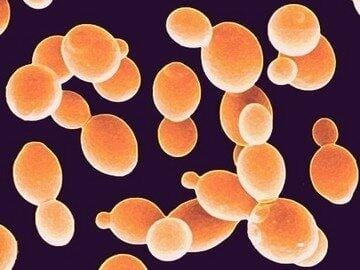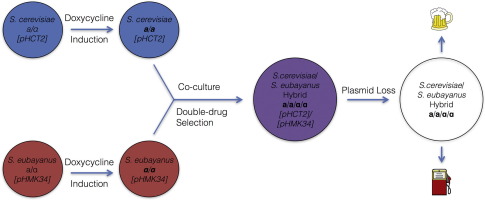New Technique to Obtain Yeast Hybrids for Food and Fuel

Researchers from University of Wisconsin-Madison have discovered a new way to cross different yeast species that allows to obtain hybrids with great economical potential. The finding, published in the journal Fungal Genetics and Biology, opens the door to experimenting with new yeast species in the food and biofuel fields.
Yeasts are unicellular eukaryotic microorganisms, usually around three micrometers long, that belong to the fungus kingdom. Some yeast species, like Saccharomyces cerevisiae, can transform carbohydrates into carbon dioxide and alcohol by a fermentation process. For this reason, budding yeast has been used for millenia in baking and in alcoholic beverage production. More recently, yeast has also found applications in ethanol production for the biofuel industry or to generate electricity in fuel cells.
S. ceverisiae is used to produce ale beer, wine and bread. 500 years ago, it naturally hybridized with the distant yeast Saccharomyces eubayanus and generated a new species that is since used to produce lager beer, the most popular alcoholic beverage worldwide. This serendipitous event -estimated odds are around one in a billion- allowed to obtain an enormously profitable natural resource, and shows the potential of engendering new species with new characteristics. Inspired by this natural incident, the research team led by Chris Todd Hittinger tried to develop a more efficient way of crossing distant yeast species to obtain hybrids with new properties.
New tetraploid hybrids for the beer industry and basic research
The researchers introduced in the yeast cells a plasmid with genes that allow them to cross with a different species. With this system, called HyPr, they could generate allotetraploid (with four sets of chromosomes) Saccharomyces strains without sporulation or nuclear genome manipulation. The new method obtains hybrids at a rate of one in a thousand cells, much faster than in nature. Within a week, different hybrids can be obtained from any two yeast species. The study presents four new hybrids; one of them derives from S. eubayanus and is being tested for a new beer recipe.
The new system is welcome by the beer industry, willing to create new flavours. Yeast researchers will also benefit from this technology, as they will be able to construct tetraploids for evolutionary genetics and genome stability studies.
Source: WISC

